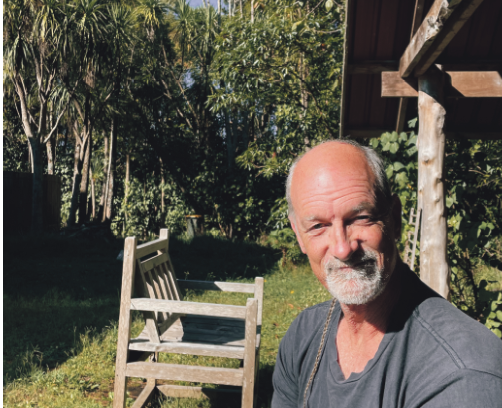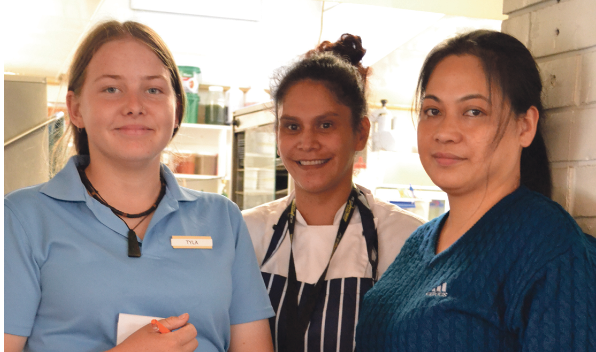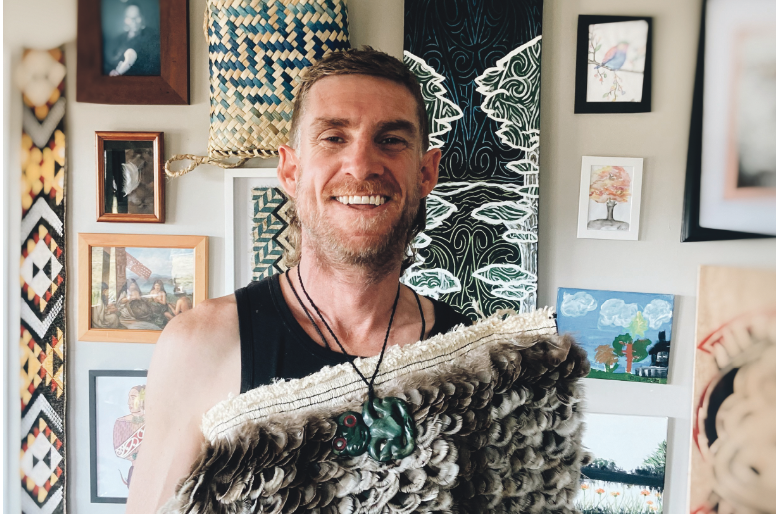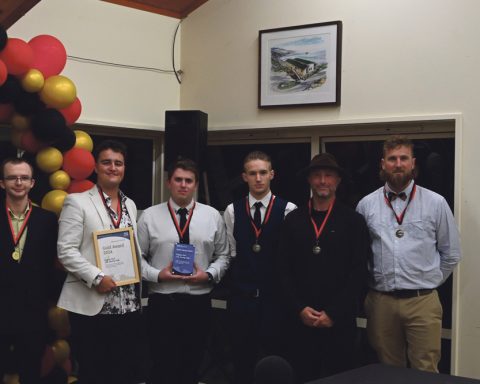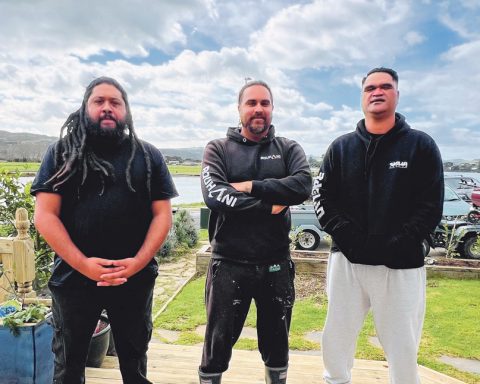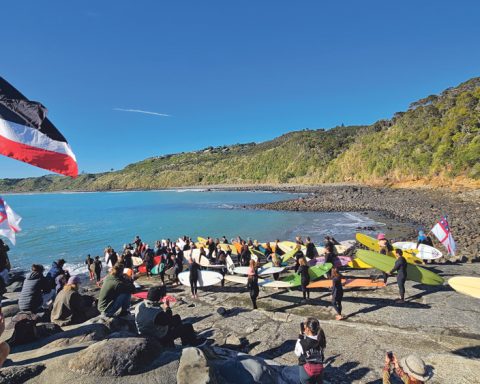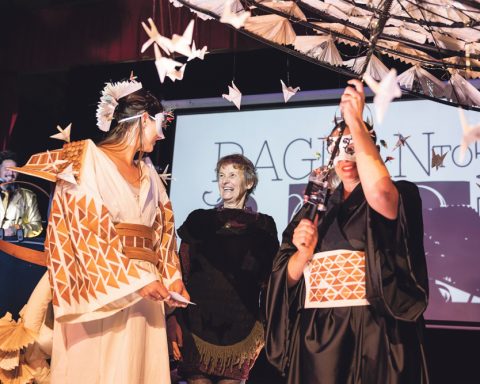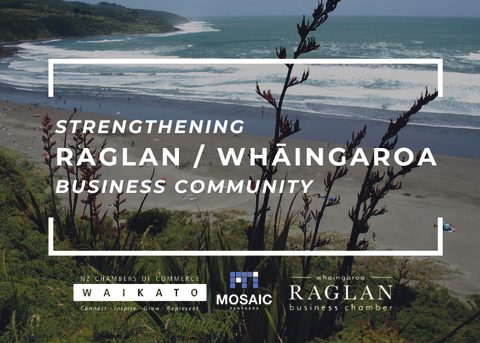Ruby Gibbs chats top Rick Thorpe.
What is your relationship like with your mental health? Is it something you think about every day?
Yes I think so, particularly as I get older and reflect. I guess it’s that balance between the physical and the mental, they’re super connected for me. I have to be onto it about what sort of kai I eat, if I’m eating well, particularly food from our garden, sun ripened, in season food, it just brings me so much joy. Like, eating plums will pull up memories deep within me of being a glutton as a young child, feasting in the trees. That kind of connection with my food is related to my mental health. And exercise as well, we are so lucky here in Whāingaroa to have amazing yoga teachers, so for me to go and be rebalanced once a week is really special. Yoga, with working on the farm, provides that balance of physical exercise, and really good food helps me to keep really good mental health.
What has your relationship been like with it in the past?
I had a very normal relationship with my parents, but a very nuclear family and I didn’t have access to aunties and uncles as I moved every two years, until my early 20’s. I didn’t have all of those super long relationships nor the ability to see people growing and going through issues and learning; it was a different community, different culture each time. I think as a young man I probably didn’t have great skills or great mentors. But I had a very unique situation where I trained as a wildlife ranger and had four years living on offshore islands and remote parts of Aotearoa.
I spent lots of time working in isolation or with one other person, so you had to deal with your shit. It was a unique opportunity where you might have 15 wet days in a row where you just couldn’t get out of the hut. It was up to you, whether you handled your shit or not, but it also gave you an opportunity to explore. You could play with your heartbeat, you could sensitise yourself in such a way. You know that feeling when you start to spin out? I could see how far that spin-out could go but I always knew that I could return. I guess in some ways it was an opportunity because there was so little other stimuli around, so I feel quite in control of my body and I think that’s also helped me in situations where there’s been a huge issue that I’ve needed to deal with and I have a reasonable amount of calmness.
I think historically in New Zealand we have prioritised this idea of men as being tough and unfeeling. Did you ever feel pressure to be that way?
Yea that’s definitely there, and to be honest I think it doesn’t go away, I think it just manifests in a different way, it still exists. There are many examples of people of my similar age who still exhibit this need to behave in such a way. You know I feel sorry for those folk for whom that is still their fallback position, who haven’t had the opportunity to perhaps grow and experiment.
Living here in Whāingaroa there’s probably less of that I think. We’ve transcended in some ways to a little bit more beyond that, more acceptance of people of a greater variety. That’s one of the beautiful things I love about Raglan, you just do your thing, no one is gonna judge that, whether it’s a male exhibiting their feminine side or women with their masculine side. I don’t know how that was built here or why but maybe it’s because we are an eclectic bunch, maybe we have built that respect.
What are the things that keep you moving forward when you are starting to feel the spiral?
I guess it’s the kaupapa which is about planet health and for me I feel really connected to some ethics and principles which I’ve built within myself. I can hold those ethics and principles and test whatever the situation is against them. I can carry them with me; it gives me confidence that I know how to react.
My ethics are kind of expressed in a simple form in permaculture ethics which is about earth care, people care, and fair share. But those have been really important for me and I do remember Whaea Eva Rickard also talking about that tikanga and kawa; you hold those things and you know how to behave because you are holding them. I think in many respects, I’ve chosen mine and it gives me a kind of pou or a feeling of strength that I can enter a situation and so long as I stay true to my ethics and principles I’m actually safe and feel confident. But that took me a while to build up.
How does having kids affect your mental health and how have you approached teaching your kids these ethics and principles?
Having kids kind of knocked me out of thinking about myself all the time and I think that is really healthy. It’s been the greatest thing I’ve ever done – being with Liz and having kids. And I guess early on, because we were involved in ecology and we could see in our short lifetime that resource depletion was very real. So we found a home, a piece of land which we could build up the type of resources that were necessary to raise a family.
We planted appropriate trees with a volume that we knew that we could build a couple of houses so we really have been growing Zak’s house and Pania’s house, and they have played in those trees with their friends and they’ve slid down the hills and built forts; they have a relationship with those trees. For Zak to come back as a man and to fell those trees, mill them and build himself a house was such a great reward. You know I’m 60 now so I’m physically on my decline and I always think about what you can grow from the soil – you can grow houses and you can grow children who are directly connected to that soil.
So what are some of the tools you keep in your mental health toolbox?
Well I don’t want to just be self-sufficient, what I want to be is community-sufficient. I want to grow, I want to be a piece in the jigsaw puzzle. Those are the things that are special to me, that people carve out a little chunk of what they want to do, their piece of the jigsaw.
Collectively we make this the most amazing place, so I want to spend my money locally, I want to support what is happening here and recognise that I don’t want to do it alone, I don’t have the skills to do it alone. That’s really important for my mental health, that I’m still providing benefit to the community I live in and utilising the skills, experiences, mistakes I’ve made in a more refined way as I get older. I’m not just gonna hit 65, wait for the pension and drink it up at the Club (no offence, it’s a great place).
My Mental Health Toolbox is available from Whaingaroa businesses.
This is a community mental health resource that we hope can help to start more conversations.
The Toolbox is free but there will be an option to donate a koha to fund the next print run.
Please email rubymgibbs@gmail.com if you would like to stock it in your business.
